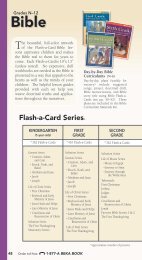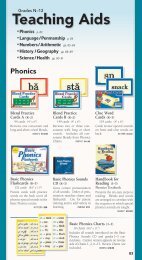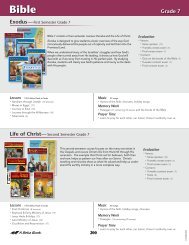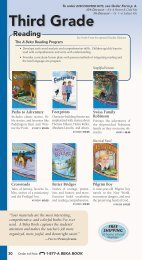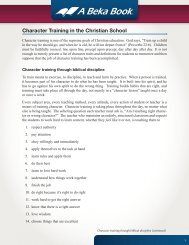Science & Health - A Beka Book
Science & Health - A Beka Book
Science & Health - A Beka Book
Create successful ePaper yourself
Turn your PDF publications into a flip-book with our unique Google optimized e-Paper software.
<strong>Science</strong>: Earth & Space Grade 8 cont.<br />
Environmental <strong>Science</strong><br />
• Environment and pollution:<br />
• Introduction to environmental science:<br />
• Biotic and abiotic factors, biogeochemical cycles<br />
h Preservationists, conservationists<br />
• Pantheism<br />
• Pollution basics<br />
h Land pollution: landfill, reclaimed, waste-to-energy incinerator, syngas<br />
h Air pollution:<br />
h Primary and secondary pollutants, formation and dangers of<br />
temperature inversion<br />
h Clean Air Acts<br />
h Water pollution: point and non-point sources, coliform bacteria<br />
h Global change:<br />
h Acid rain<br />
h Ozone depletion:<br />
h Rowland-Molina hypothesis, freons, halons<br />
h Ozone-depleting substances, Montreal Protocol<br />
h Hydrochlorofluorocarbons, fluorocarbons<br />
<strong>Science</strong> & <strong>Health</strong><br />
<strong>Science</strong> of the Physical Creation Grade 9<br />
166<br />
Grades 8–9<br />
h red indicates NeW MATerIAL<br />
• Global warming: anthropogenic global warming, Medieval Climate<br />
Optimum, Little Ice Age<br />
• Managing our resources:<br />
• Biblical commands<br />
• Examining our resources:<br />
h Non-renewable and renewable resources<br />
• Sustainable development, environmental technology<br />
h Water reclamation<br />
• Recycling programs<br />
• Renewable energy:<br />
• Solar energy:<br />
h Active and passive solar power, photovoltaic cells, concentrating<br />
solar power<br />
• Wind power:<br />
h Wind turbine, wind farm<br />
h Hydroelectric power<br />
h Nuclear power:<br />
h Nuclear chemistry, nuclear fission, nuclear chain reaction<br />
h Nuclear reactor, breeder reactor<br />
<strong>Science</strong> of the Physical Creation builds a foundation for future studies in chemistry, physics, and other<br />
fields. The Christian perspective of this text naturally rejects the unproven hypothe sis of evolution,<br />
recognizing special c reation as the only reasonable explanation for the universe’s origin. This position is<br />
presented throughout the text and highlighted in a chapter on the fossil record, which provides evidence<br />
against evolution and for the reality of the Genesis Flood.<br />
<strong>Science</strong> of the Physical Creation also recognizes God’s command for man to have dominion over creation.<br />
Thus the purpose of science becomes the application of scientific knowledge for mankind’s benefit. From<br />
chemistry to physics, the goal is to learn how man might extend his “dominion” and make better use<br />
of creation. With man’s dominion over the earth comes a responsibility to tend, manage, and conserve<br />
resources. However, the ultimate purpose of creation must not be forgotten—the earth was made for<br />
man to inhabit, and its resources were made for man to use.<br />
Added Enrichment<br />
• Feature boxes with activities, puzzles, extra information,<br />
articles highlighting God’s design in creation, 36 articles<br />
regarding environmental issues<br />
• Classroom demonstrations with student participation (34)<br />
• Challenging homework questions to make students think<br />
more deeply about concepts (38)<br />
Introduction to <strong>Science</strong><br />
• <strong>Science</strong> and mathematics:<br />
h Descriptions, limitations, truth and error<br />
• Equations<br />
h red indicates NeW MATerIAL<br />
Evaluation<br />
• Reading quizzes (14)<br />
• Review quizzes (36)<br />
• <strong>Science</strong> project with background paper, investigation<br />
plan, experimentation, follow-up paper, created display,<br />
oral presentation (counts as test grade)<br />
• Tests (8), mid-semester tests (2)<br />
• Semester exam, final exam<br />
• <strong>Science</strong> and measurement:<br />
h Limitations of measurement, accuracy, precision<br />
• Scientific notation, measurement systems, SI units<br />
• Scientific method:<br />
• 3-step process, theories, laws<br />
h Predictions, assumptions<br />
<strong>Science</strong> of the Physical Creation cont. p. 167



